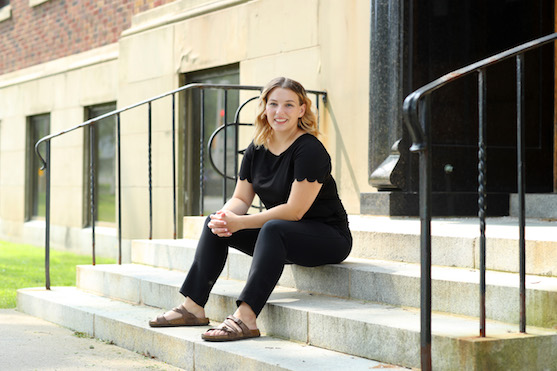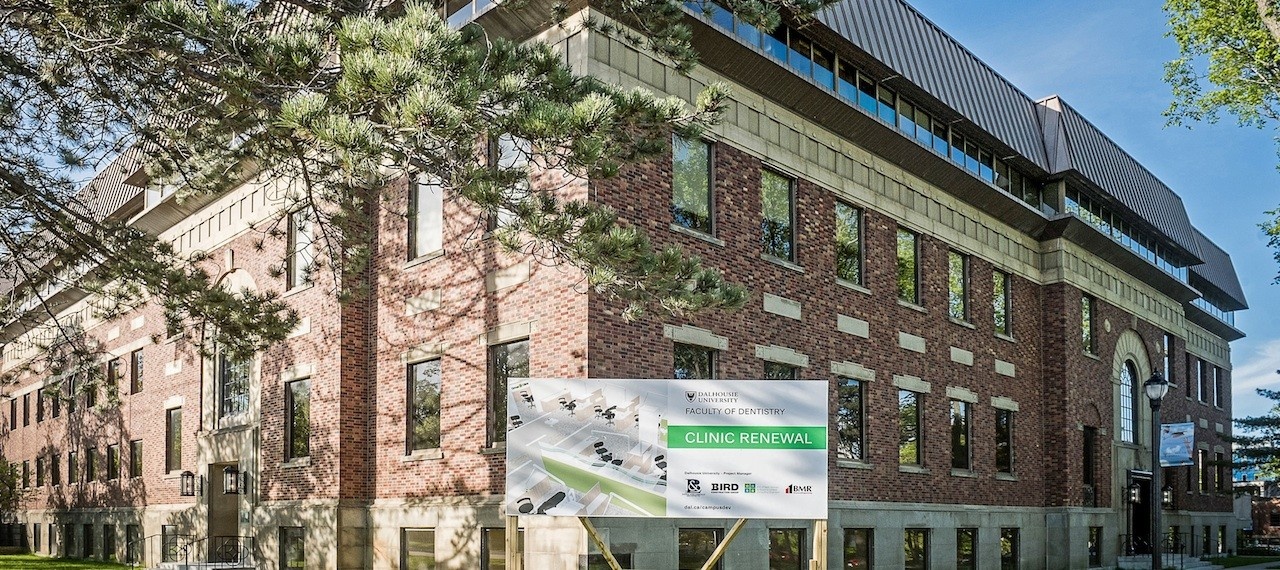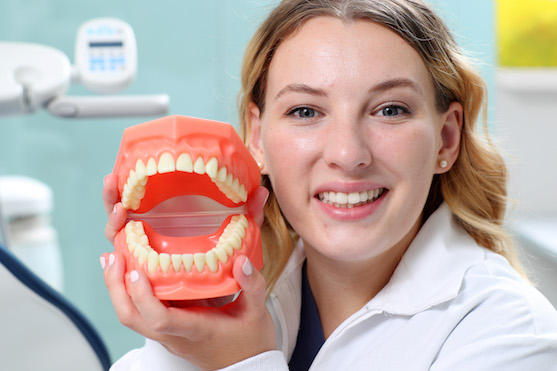News
» Go to news mainGrad profile: Jennifer Johnson DDH'21
Photos by Nick Pearce
Jennifer Johnson maintains that repairing excavators and rock trucks and working as a dental hygienist are not as different as one might initially think. She should know: she was a heavy equipment technician apprentice before deciding to study dental hygiene at ±«Óătv.
âThere are actually a lot of transferrable skills,â she says, âlike problem-solving, hands-on working, and operating in tight quarters.â Jennifer admits that heavy equipment maintenance provided her with a good job at Toromont Cat in Dartmouth and it was the beginning of a promising career. But. . .there was a âmissing puzzle pieceâ.
The moment of truth
Originally from New Glasgow, Jennifer went to NSCC Pictou to study for a diploma in heavy duty transport repair. âI wasnât exactly sure what to do when left high school, but I knew I wanted to do something hands-on and educationally challenging. And there was a lot of problem solving with that career.â
The moment of truth came when Jennifer asked herself what was missing. And the answer was working with people and enjoying relationships with them.
The health professions, and specifically dental hygiene, had appealed to her for some time. âI feel that dental hygiene is a field where there is an opportunity for growth and expansion. I think the career is developing and going through a transformation at this moment.â
With her eye on the goal, Jennifer set about achieving it. âBelieve it or not,â she says, ⱫÓătv does not take any transfer credits from the technician program I was in previously. Apparently, there is no âFixing big machines 101â or anything like that offered at Dal.â
Although Jennifer jokes about the position she found herself in when she decided to pursue dental hygiene as a new career, âstarting from the bottom againâ was not easy. She attended Dal in the 2018-19 academic year to take all the prerequisites she needed to be able to study dental hygiene. She focused on the sciences, adding in two terms of Greek mythology to fulfil the language requirements.
What did I do?
âAt the end of my first week at Dal, I was thinking âWhat did I do? I left a very good job. I left a very good careerââ. But she quickly realized she had made the right choice.
In the autumn of 2019, Jenniferâs dental hygiene studies began in earnest. First semester gave her the âtypical dental hygiene experience of sim lab and looking forward to patient careâ. So far, so normal. But in March 2020, however, everything came to a âdead stopâ, at least initially. COVID-19 had arrived.
âWe all thought the pandemic would affect us for a couple of weeks,â says Jennifer, âbut we know how that turned out.â She appreciates how difficult it was for the professors who had to âadapt and pivot so many timesâ over the past year. And while online learning presented challenges, it had some bonuses as well, she says.
Typically, Jennifer would commute into the Dentistry Building from her home in East Hants each day. âNormally, we had to be in the building from 8:00 am until around 5:00. So I enjoyed the new flexibility that online learning offered.â
She believes that the new arrangements encouraged students to stay accountable for their own learning. âI found that if I had a question, I had to take the next step of setting up a meeting instead of simply raising my hand in class and getting immediate clarification.â
What is the best part of dental hygiene school for her? âI have to say clinic is my favourite â which is probably a good sign! Itâs the whole point of what youâre doing, isnât it? Itâs where you get to interact with patients and apply your knowledge base.â
Even though studying dental hygiene involves a lot of courses â and a comparable number of midterms â Jennifer feels that every course and every lab she did was building a base for her clinical skills.
That doesnât mean that treating her first patient wasnât nerve-wracking. âI think that until you have practice doing it, thereâs no way youâre not going to feel a little nervous. But I knew that those early appointments were the start of getting good at doing what I do.â
What Jennifer also found gratifying was having patients return in the spring whom she had seen at the beginning of the academic year and having them notice how much faster and better she had become. In addition, there were the clinical changes that Jennifer could see in her patientsâ mouths when they tried out the techniques she had suggested to them.
Through the difficult months of COVID-19, Jennifer feels that she had the support of both her classmates and faculty members. No one makes it through dental hygiene school alone, she says.
Faculty members are particularly supportive, Jennifer maintains. âThere is a strong culture of continuing development and education that they bring to the table. They lead by example by constantly improving their skills and they are also able to give us a lot of personalized feedback. They also get to know us as people over our two years in the program, which is really, really nice.â
 Wider roles for dental hygienists
Wider roles for dental hygienists
The feeling that the dental hygiene profession is changing and developing â which attracted Jennifer to it in the first place â continues to guide her next steps. She believes there is a growing awareness that the oral cavity is connected to the rest of the body and that poor oral health has a major impact on overall health.
âThanks to our professors, we have rotations in schools, hospitals, and outreach clinics,â says Jennifer. âThat experience is helping to expand our role as dental hygienists and change the dynamic of simply working for a dentist in a private practice to expanding our role out into the community.â
Jenniferâs next step is working at Dr. Kohli Dental Clinic in Carbonear, Newfoundland, owned by Dr. Kash Kohli (DDSâ18). At some point, she plans to return to ±«Óătv to study for a Bachelor of Dental Hygiene (BDH), potentially through the new part-time program.
âGoing to work before returning for further studies is important to me. It will give me an opportunity to see a bit more of whatâs out there, because we canât experience every scenario at Dal. But then it would be great to return to do the BDH and explore the wider roles available to us as dental hygienists.â
Recent News
- Strategic Plan: 2021â2026: Progress so far
- The 2025 Faculty of Dentistry Impact Award goes to Tarik Abdulkarim
- Dr. Leigha Rock takes on the presidency of the CADR
- Malek Mahmoud â A vision and a plan
- The 2024 QEII Foundation Diversity in Health Care Bursaries: Feeling seen and included
- Celebrating African Heritage Month with an award
- New Bachelor of Dental Hygiene degree programs to start in 2025â26
- Announcing a new path for licensure in Canada for internationallyâtrained dentists

